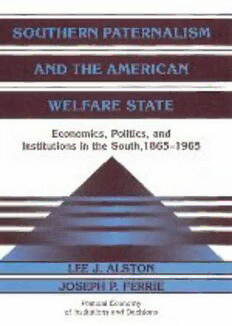
Southern Paternalism and the American Welfare State: Economics, Politics, and Institutions in the South, 1865-1965 (Political Economy of Institutions and Decisions) PDF
184 Pages·1999·4.585 MB·English
Most books are stored in the elastic cloud where traffic is expensive. For this reason, we have a limit on daily download.
Preview Southern Paternalism and the American Welfare State: Economics, Politics, and Institutions in the South, 1865-1965 (Political Economy of Institutions and Decisions)
Description:
Combining insights from economics, political science, and history, Professors Alston and Ferrie show how the timing and extent of the growth of the American welfare state from the Civil War until the mid-1960s was influenced by the Southern agricultural elite. Before the mechanization of Southern agriculture, the rural landed interests had an economic incentive to keep labor cheap and dependent. They accomplished this through their disproportionate political power at the local, state, and national level, which enabled them to maintain a discriminatory legal environment and prevent federal interference in labor relations.
See more
The list of books you might like
Most books are stored in the elastic cloud where traffic is expensive. For this reason, we have a limit on daily download.
